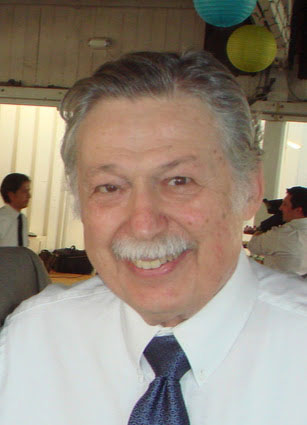Edward Della Torre, a longtime professor of engineering and applied science and a renowned researcher, died on Dec. 27 from heart complications. He was 85.

Courtesy of Cindy Cicalese
Della Torre began teaching magnetics and artificial intelligence at GW in the early 1980s after working at Wayne State University, a research university in Detroit. He planned to retire at the end of this semester after wrapping up an upper-level undergraduate engineering course on fields and waves, colleagues said.
Della Torre’s family, colleagues and former students said he was a “true scholar” in the field of magnetics and will be remembered for his sense of humor, humility and dedication to students.
He was born in 1934 in Milan and immigrated to the United States when he was about 5 years old. He grew up in New York City, Cindy Cicalese, a double alumna and Della Torre’s daughter, said.
Della Torre received a bachelor’s degree in electrical engineering from the Polytechnic Institute of Brooklyn in 1954 and a master’s degree in electrical engineering from Princeton University in 1956. He was also awarded a master’s degree in physics from Rutgers University in 1961 and a doctorate in electric engineering from Columbia University in 1964, Cicalese said.
Before Della Torre began working at GW in 1982, Cicalese said her father was the chairman of the electrical engineering departments at McMaster University in Ontario and Wayne State University in Detroit.
“He cared very much for his students,” she said. “Over the years, we would hear tales and stories of how his students were progressing, and they became almost part of the family.”
Cicalese said both her parents have “a great love” for music, and Della Torre had a “great knowledge and interest” in classical music. She said that until his death, he would go “as often as he could” to operas and other musical functions.
“There was always music on,” she said. “You would walk into their house and there was always some classical piece playing.”
Murray Leow, a professor of biomedical engineering, said he was most “struck” by Della Torre’s care for his students in addition to his prestige in the magnetics field.
“He would speak up in faculty meetings and talk about what he thought the department ought to do,” Leow said. “I think he was uniformly respected by everybody in the department, first for his technical prowess and achievements but also for his calm leadership.”
Even though he is not a “magnetics person,” Leow remembers Della Torre personally giving him a copy of “Magnetic Hysteresis,” a book about the development of magnetism that the late professor published in 1999. Leow said the book still sits on his bookshelf.
“I was honored, in a way, that he felt he wanted me to have a copy of it,” he said. “It was a point of pride for him, and I was happy that he wanted to give it to me anyway.”
Can Korman, a professor of engineering and applied science and the associate dean of research and graduate studies, said that even though Della Torre looked serious, he will remember him for his “great, gregarious laugh.” He said Della Torre’s laugh would echo throughout Phillips Hall when their department was located in the Academic Center.
“His office was all the way on the other end of the hallway from mine, but when he was down there and he was laughing, the whole entire hall would know Ed was laughing,” Korman said.
Korman said that Della Torre has been well-known in the field of magnetics since the 1960s and was a “true scientist and scholar.” He said Della Torre was “very helpful” to junior faculty when introducing them to experts in their field and mentoring them through their research endeavors.
Amir Aslani, an assistant professor of practice in electrical and computer engineering and one of Della Torre’s former students, said Della Torre was a lifetime fellow in the IEEE Magnetics Society, the “highest honor” in the group.
Aslani said Della Torre was one of the “best brains” in the society and knowledgeable in the field but was also humble. He said it was “an honor” to have studied with Della Torre when he was working toward getting his doctorate, which he will have on his resume and throughout his career.
“One thing that I am proud of is that I am going to carry his name on my CV for the rest of my life,” he said.
Aslani said that of Della’s Torre’s past five doctoral students, the last three are now teaching assistants in their fields. He said that as a professor, Della Torre was “very patient” and passed down his knowledge of magnetics and engineering to his students, which inspired Aslani to become a teacher.
“Imagine if you are God of your area, you expect that someone would look down on you, but he never was like that,” he said.
Della Torre is survived by his wife, Sonia; his daughter, Cindy Cicalese; and his sons, Marc and Neal. He is also survived by two grandchildren, Anthony and Amelia.



